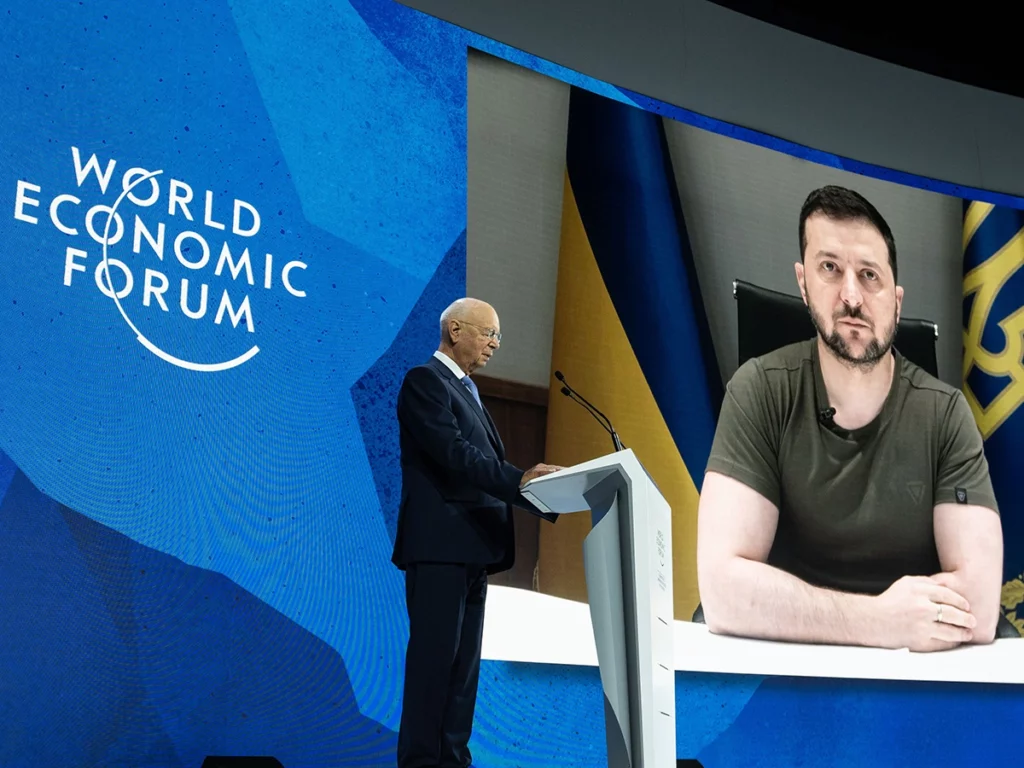by Lauren Woodman, CEO, DataKind
Image: President of Ukraine, Volodymyr Zelenskyy, addressing the 2022 World Economic Forum
As DataKind marks a major milestone—our 10th Anniversary—I’m wondering if our past ten years of Data Science and AI for Good work have simply been the warm up act for the challenges the world is facing in 2022 and beyond.
I recently participated in the World Economic Forum Annual Meeting in Davos, Switzerland, and had the honor of witnessing the President of Ukraine, Volodymyr Zelenskyy, join the proceedings. We were all moved (and chilled) by his impassioned plea for increased sanctions on Russia. He warned of the threat of “hunger, poverty, despair, and chaos” as a byproduct of Russia’s aggression, not just to the Ukrainian people, but to “the world.” Now, just over six months after the invasion began, we’re seeing President Zelenskyy’s warning play out across the global stage.
Many of the Forum’s most compelling panels focused on the fast growing global food crisis as a result of disrupted supply chains and the war. And those presentations have been followed by equally dire warnings during the G7 Summit and from the United Nations Food and Agriculture Organization, the World Health Organization, and many others. The number of people and countries that’ll be affected are staggering, with an estimated 47 million additional people pushed into poverty and food insecurity this year alone. It’s sobering.
In response, the DataKind team and our passionate global volunteer community are identifying promising areas for data science solutions to tackle various dimensions of food security. In an upcoming landscaping paper, DataKind presents areas where data science can yield the greatest impact and reach the people who are most affected by food crises and the fractures in existing food systems. Key dimensions that are critical to enabling sustainable and reliable food systems include:
Availability.
Potential data science opportunity: Satellite imagery can be used to identify blight across large land areas and inform early warning and early action systems, which can lead to higher crop yields and stability within the communities that rely on those particular crops.
Accessibility.
Potential data science opportunity: Both conventional and unconventional data sources can be used to predict prices and adjust programming interventions that food services organizations implement to serve more individuals.
Utility.
Potential data science opportunity: Natural language processing can help analyze manufacturer-provided ingredient lists and enable food distribution providers to make smarter recommendations, leading to greater community health.
Stability.
Potential data science opportunity: Predictive modeling can help anticipate demand and forecast the time to restock at critical facilities for organizations with multinational food distribution programs, leading to more automated ordering and supply management and ultimately more individuals being served.
This fall, DataKind will publicly release our suite of landscaping papers that includes the future of food security. Already, the work suggests that we have a strong handle on the supply-side of food security data, but very limited data related to the potential demand-side such as how much food will be needed, where, and when. This should be a logical place to unleash DataKind’s predictive technology superpowers.
In addition to this, DataKind will be recruiting project partners with the knowledge, networks, and expertise that can effectively use data science for greater impact. If you know of any promising partners, please have them reach out to us.
At the same time, our team will be recruiting top data science professionals and bringing them together with leading subject matter experts. Together, they will scope available data sets to discover the most promising opportunities. They’ll also set up remote teams that can work asynchronously across 19+ global time zones to deliver insights and interventions BEFORE they’re needed.
Lastly, DataKind is making this special appeal to our key funders and YOU to ensure that our teams have the capacity they need to build solutions that scale, last, and drive maximum global impact in alleviating food insecurity. Please help fund this important work by joining our fast growing World Hunger Circle.
While we celebrate DataKind’s 10th Anniversary, we’re focused on the next 10 years, taking on some of the world’s most pressing challenges with the power of data science and AI. And we thank you for joining us and rooting us on.
 Lauren Woodman is DataKind’s Chief Executive Officer and has spent 25 years working at the intersection of technology, development, and policy. Most recently, she was the CEO of NetHope, a consortium of 60 of the largest global nonprofits and tech companies from 2014-2020. Before that, she held a variety of positions in the private sector, government, and the UN, including managing Microsoft’s global education and government programs for more than a decade and serving as an executive at the Software and Information Industry Association. Currently, she is a member of the World Economic Forum’s Board of Stewards for its Initiative on Digital Economy and its Trustworthy Data Collaboration.
Lauren Woodman is DataKind’s Chief Executive Officer and has spent 25 years working at the intersection of technology, development, and policy. Most recently, she was the CEO of NetHope, a consortium of 60 of the largest global nonprofits and tech companies from 2014-2020. Before that, she held a variety of positions in the private sector, government, and the UN, including managing Microsoft’s global education and government programs for more than a decade and serving as an executive at the Software and Information Industry Association. Currently, she is a member of the World Economic Forum’s Board of Stewards for its Initiative on Digital Economy and its Trustworthy Data Collaboration.
If you’re interested in supporting our work to help alleviate food insecurity, please reach out to us using the following links.
- Interested in supporting our work or joining our Global World Hunger Circle? Please join here.
- Interested in sponsoring a project? Partner with us here.
- Interested in volunteering with DataKind? Look no further.



